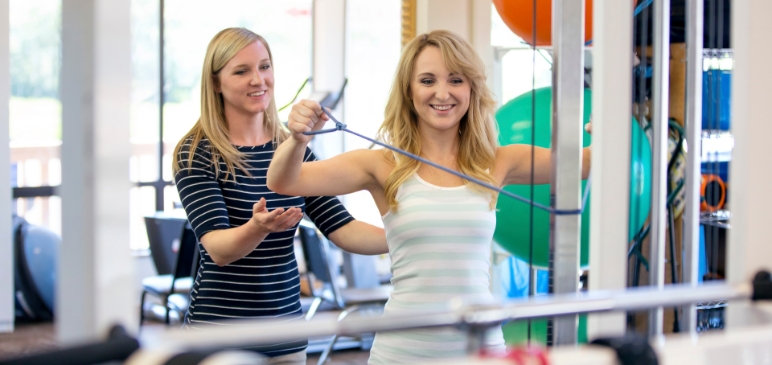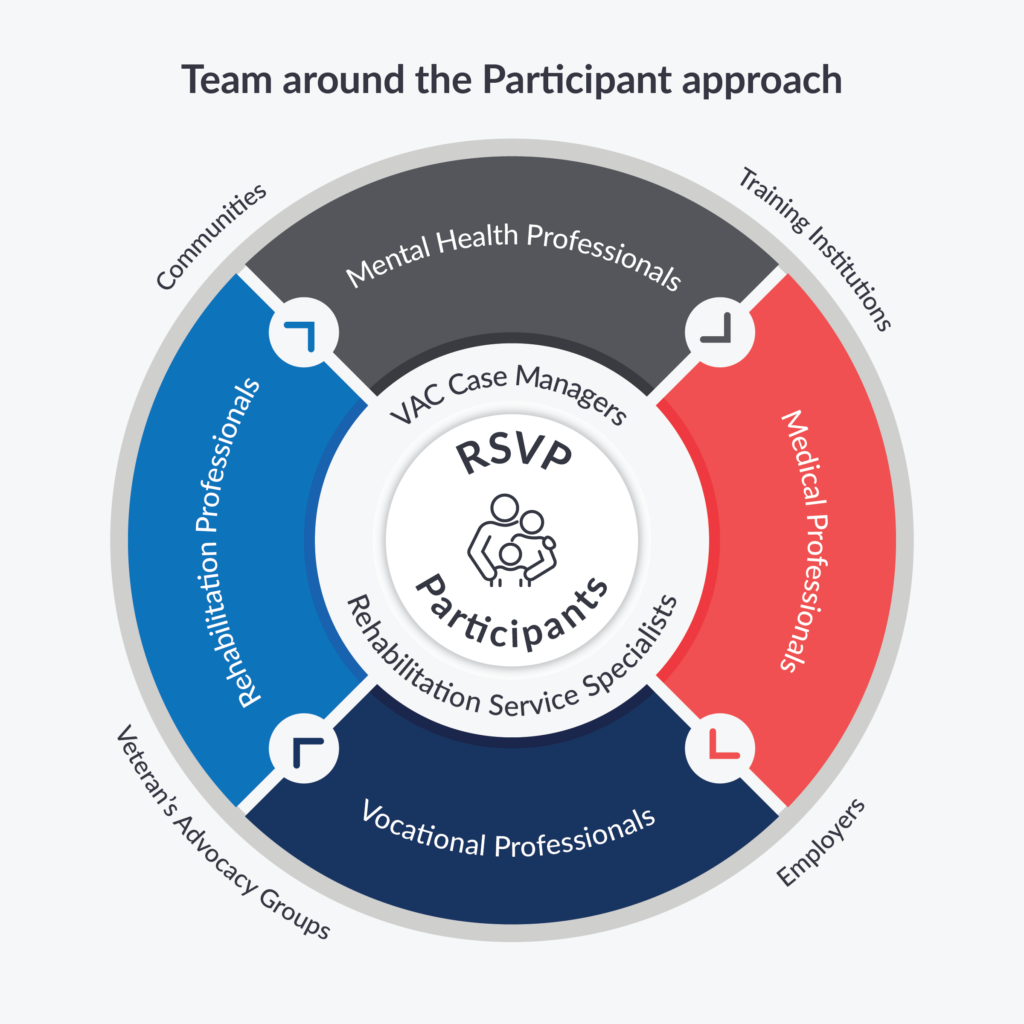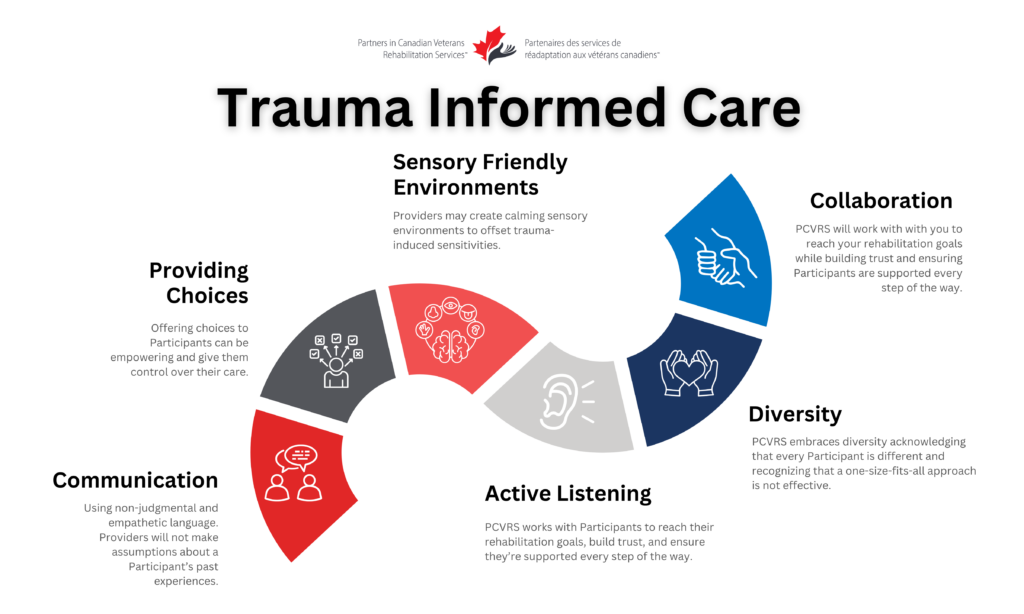PCVRS supports Veterans in the Rehabilitation Services and Vocational Assistance Program (RSVP) to deliver the best support, we consider each Veteran’s unique background, experience, and needs. Women Veterans have served Canada with dedication and courage, and PCVRS is dedicated to providing comprehensive and compassionate support to help them thrive as they transition to life after service.
We're proud that our team of rehabilitation service specialists and professionals includes dedicated women, who bring a valuable point of view to RSVP. Our diverse teams enhance the quality of care and support we offer. It helps ensure that women Veterans, and others, feel understood, respected, and empowered.
At PCVRS, we understand rehabilitation is deeply personal. That's why we use a holistic approach. We look at all aspects of your well-being―physical, mental, and emotional and go beyond treating symptoms to focus on your overall rehabilitation needs and resilience.
Each Participant has unique rehabilitation needs and goals. You may want to regain strength, manage pain, overcome a mental health challenge, or develop new skills for employment. We work with you to create a Rehabilitation Plan that’s tailored to you.
A cornerstone of our approach is to meet Veterans ‘where they are’. We understand that fitting rehabilitation into your life may be hard because of family responsibilities or other commitments. We work closely with each Participant to develop a plan that integrates into your life so you can actively participate.
We're committed to making the program accessible, effective, and empowering for everyone and supporting you with appointment times that fit with your schedule. Virtual sessions may be easier to attend if you live in a remote area or have mobility challenges. We tailor our approach so you can actively participate and get the most from your Rehabilitation Plan.

“Veterans Affairs Canada (VAC) Rehabilitation Services and Vocational Assistance Program (Rehabilitation Program) saved my life, and I am grateful for the empowering opportunities afforded to me in successfully navigating my Military-to-Civilian Transition (MCT). With support from VAC and a case manager who championed my autonomy, I am forever grateful for the clarity and strength that emerged as I began to realize my sense of purpose post-service and regained my sense of dignity.”
—PCVRS Woman Participant Testimonial
At PCVRS, we are committed to providing every Veteran with the respect, care, and support they deserve as they work toward their rehabilitation goals. For women Veterans, we recognize the importance of addressing their unique needs. Every journey is different, but our commitment remains the same: to provide Veterans with unwavering support on their rehabilitation journey.
Assessments are among the first steps in your rehabilitation journey with PCVRS. After you meet your Rehabilitation Service Specialist (RSS), get an overview of the program, you have the assessments to identify your needs. From these assessments, rehabilitation goals and required services are identified. If you have an eligible mental health problem, you may be referred to a mental health professional for a psychological assessment. In this blog, we explore psychological assessments, what happens during an assessment, and what they are used for.
Dr. Sylvie Bourgeois is the Medical Director of Psychology and Mental Health at PCVRS. We asked Dr. Bourgeois, a Ph.D. psychologist with nearly twenty years experience, why psychological assessments are so important.
“The rehabilitation focused psychological assessment, assesses the Participant’s current
ability regarding their activities of daily living, family life, and community. It focuses on
how the symptoms of eligible mental health problems impact everyday functioning. The psychological assessment aims to identify what types of psycho-social rehabilitation services may improve a Participant’s ability to function at home, in the community, and at work.”
Dr. Bourgeois explains that a psychological assessment can:
“The rehabilitation assessment process is designed to be participant-centered,” she adds. “It considers where the Participant is in their rehabilitation journey. Our Rehabilitation Service Professionals make sure Participants understand the intent and purpose of the assessment and are there to answer any questions.”

The psychological assessment is part of a step-by-step process. Here’s how it works:
1. Initial Consultation: You will meet with a psychologist or a member of the PCVRS mental health team to discuss your background, challenges, and goals. You’ll also review consent forms and talk about how PCVRS protects your privacy.
2. Assessment Activities: You may be asked to complete questionnaires, interviews, or activities. An assessment may take three or four hours but will vary depending on your needs. An assessment typically takes place over two sessions.
3. Feedback Session: A Rehabilitation Service Professional (RSP) will discuss the results of the assessment with you and explain how the Rehabilitation Service Specialist (RSS) will use the assessment results to determine which rehabilitation services may be included in your Rehabilitation Plan.
4. Rehabilitation Plan Created: The RSS will receive the assessment report and use it to determine if there are rehabilitation needs that should be addressed in a Rehabilitation Plan. If there are, they’ll work with you and your VAC Case Manager to create a Rehabilitation Plan with goals and milestones.
5. Collaborative Planning: Once the VAC Case Manager approves the Rehabilitation Plan, you will collaborate with your RSS, RSPs, and VAC Case Manager to meet your rehabilitation goals.
Starting a rehabilitation journey can bring a lot of questions. We’re here to help. Before each assessment, we provide an appointment package, so you know what to expect and how to prepare. Our goal is to make the process as smooth as possible.
At PCVRS, we are committed to providing supportive and effective rehabilitation services. Psychological assessments are a vital part of that commitment, helping us to identify your potential for improved functioning in everyday life, and support in the rehabilitation journey. We encourage you to ask your rehabilitation team if you have any questions about your rehabilitation journey.
Trauma-informed care is used to describe PCVRS’ approach when working with Veterans who have experienced trauma. PCVRS provides a Participant-centric approach that is culturally sensitive, respectful of diversity, and a trauma-informed. This approach isn’t just a rehabilitation model, it’s a philosophy of care that recognizes the unique experiences of Veterans and promotes a climate of collaboration, safety and empowerment. It aligns with our “Team around the Participant Approach” and how we work with you through every phase of your rehabilitation.

With PCVRS, the focus is on you, the Participant. Trauma-informed care ensures that our team of providers, your Rehabilitation Service Specialist (RSS) and your VAC Case Manager walk beside you, not just as the rehabilitation team, but as allies in your rehabilitation journey.

The trauma-informed model is evidence-informed and grounded in neuroscience, psychology, and Veteran-centred research. It enhances your rehabilitation journey by:
Rehabilitation is not a passive process:
At PCVRS, trauma-informed care is more than a best practice, it’s a commitment. A commitment to see you as a whole person. A commitment to provide care that is respectful and empowering.
Now, let us help support your rehabilitation, with care that understands where you’ve been and where you want to go.
Every stage of Veterans Affairs Canada's (VAC) Rehabilitation Services and Vocational Assistance Program (RSVP) is designed to help Participants achieve their rehabilitation goals. At Partners in Canadian Veterans Rehabilitation Services (PCVRS), we aim to improve rehabilitation outcomes by establishing realistic rehabilitation goals with the Participant that build on their abilities, interests, and strengths.
Every rehabilitation journey is unique, so the duration of a Rehabilitation Plan, the type of services recommended, and the number of sessions will vary based on individual needs. Some Participants may require in-clinic sessions, while others may benefit from a virtual setting and home exercise plan.
No matter what a Participant’s Rehabilitation Plan looks like, our focus is the continual improvement of their eligible health problem. We provide the support system necessary for Participants to focus on their medical, psychosocial and vocational rehabilitation goals.
PCVRS uses standardized reporting to measure and evaluate rehabilitation progress making sure Participants have the support they need to reach their rehabilitation goals. A Rehabilitation Plan is complete when a Participant achieves or mostly achieves their rehabilitation goals or no further improvement is anticipated. Participants have the opportunity to discuss their file with their Rehabilitation Service Specialist (RSS) and VAC Case Manager before it is closed.
PCVRS supports Participants’ rehabilitation needs and is dedicated to providing Participants with the resources they need when reaching the end of their Rehabilitation Plan. After a Participant’s Rehabilitation Plan is completed, they will continue to have access to a range of tools and resources on the PCVRS Participant Portal such as the Participant Training Centre. It provides access to a large catalogue of free, self-directed courses on professional and personal development topics and is available for up to one year after the Rehabilitation Program ends.
If a Participant needs ongoing treatment for chronic conditions or to maintain their current level of function, their VAC Case Manager can support them. If you are an RSVP Participant please speak to your VAC Case Manager to discuss additional services and benefits offered through VAC.
The goal of Veterans Affairs Canada’s (VAC’s) Rehabilitation Services and Vocational Assistance Program (RSVP) is to improve your life at home, in your community, and at work. To support you in reaching your rehabilitation goals, Partners in Canadian Veterans Rehabilitation Services (PCVRS) delivers rehabilitation services for a specific period of time based on your unique needs. Rehabilitation services address barriers that are impacting your re-establishment to life after service.
Intervention begins after your rehabilitation needs have been assessed and your Rehabilitation Plan has been developed. Your Rehabilitation Service Specialist (RSS) will coordinate rehabilitation services to meet your rehabilitation needs. These services will be specific to the rehabilitation goals that you have discussed with your RSS and VAC Case Manager and may include services provided by medical, psycho-social or vocational Rehabilitation Service Professionals (RSPs). Your rehabilitation services will be scheduled either in-person, virtually, or possibly a combination of the two, depending on your needs and the availability of the service.
During the Intervention Phase, your “Team” of RSPs as well as your RSS and VAC Case Manager will support you and your active participation in your Rehabilitation Plan. This includes preparing you for upcoming appointments, discussing your progress, and in some cases, adjusting your Rehabilitation Plan based on your needs.
Each Rehabilitation Plan is personalized and includes specific rehabilitation goals, called SMART goals defined as:
The goals in your Rehabilitation Plan are set to help you and your rehabilitation team monitor your progress, track your successes and make adjustments to support you in achieving your goals. This approach is supported by Veteran-focused research in the Journal of General Internal Medicine (2021) that assessed the complex needs of Veterans and recommended Participant-centered goals that focused on specific functional health outcomes.
Occupational Therapists (OTs) can help you overcome physical or mental health barriers that impact your ability to do the activities you want to do, need to do, or are expected to do in your daily life. OTs help you identify activities that are meaningful to you and break them down into smaller tasks to help you can gain independence.
For example, a Participant may experience social anxiety due to their PTSD resulting in them avoiding crowds or working in groups. OT services may be delivered to help the Participant achieve their goals by initially having them meeting in small, quiet environments then gradually increasing, over time, to larger, public spaces. By working with OTs Participants can also learn coping strategies such as breathing exercises or mindfulness techniques to help improve relaxation, concentration and attention span within these environments.
The Intervention Phase is where the rehabilitation work occurs and where you should start to see progress. Your hard work and dedication will set you up for success.
As we enter a new phase in healthcare, rehabilitation services are changing to meet the specific needs of Canadian Veterans. Partners in Canadian Veterans Rehabilitation Services (PCVRS) is leading this transformation, using advanced technologies to improve the rehabilitation process. In this blog post, we will explore the importance of Virtual Care and how it can contribute to your rehabilitation.
Accessibility Beyond Boundaries
With virtual care, Veterans can access important rehabilitation support no matter where they live. Whether you're in a small town or big city, PCVRS uses online platforms to bring rehabilitation services right to you.
Personalized Rehabilitation Plans:
Every journey is unique, and PCVRS knows how important it is to create a rehabilitation plan that will fit individual needs. With your health care providers help, you might decide that virtual care is an option that works for you. Using online tools, you can benefit from personalized sessions that focus on your specific challenges, making the rehabilitation process more accessible.
Our virtual care platform seamlessly integrates vocational rehabilitation services, empowering individuals to reclaim their professional pursuits from the comfort of their own space. Whether navigating career transitions or seeking specialized guidance, our virtual care approach ensures personalized and effective support to enhance occupational well-being.
Enhanced Support:

Rehabilitation is not just physical; it also helps with career planning and mental and emotional well-being. Our virtual care platform includes vocational rehabilitation services and mental health support, as part of the rehabilitation process. Through online counseling, Veterans can address their vocational and mental health needs.
Safety and Comfort:
Virtual care focuses on keeping you safe and comfortable. By participating in virtual sessions, you can do rehabilitation activities right from your home, meaning less stress and time spent travelling or figuring out unfamiliar spaces. This helps create a relaxed experience and helps with better rehabilitation results.
Real-time Progress Tracking:
PCVRS uses advanced technology to monitor your progress in real-time. Virtual platforms make communication between Veterans and rehabilitation professionals easy, so changes to your rehabilitation plan can happen quickly if your needs change. This approach ensures that your rehabilitation journey is always on track.
Community Engagement:
PCVRS understands the importance of a team around the participant approach through the rehabilitation process and actively promotes teamwork using virtual care.
In the world of rehabilitation, adding virtual care is a game-changer. PCVRS is committed to using these innovative approaches to provide accessible, personalized, and comprehensive support to Veterans across the country. We hope you embrace the future of rehabilitation with PCVRS, where virtual services not only bridge gaps but also create a more connected, efficient, and successful rehabilitation process. Your path to recovery is evolving – let PCVRS help you succeed.
Canadian soldiers are used to facing challenges. But after releasing from the military, they can face new challenges they may not have encountered before. This is especially true for their mental health.
Partners in Canadian Veterans Rehabilitation Services (PCVRS) is dedicated to getting Veterans the mental health support they need. We are a leader in providing Veteran-centered, specialized care for mental health and well-being.
PCVRS is committed to providing tailored treatment and rehabilitation interventions that address your mental health needs. We aim to empower you. Our ''abilities'' focused approach emphasizes your strengths, rather than focusing on your limitations or challenges. This way, we help you develop coping strategies that build from your own skills and strengths. Here are some other key benefits of our approach that set PCVRS apart:
Holistic Approach:
We understand that mental health is complex. Our rehabilitation services encompass a holistic approach. We consider everything that affects your situation—psychological, social, emotional, and physical well-being—to help you succeed.
Experienced, Interdisciplinary Team:
Our team includes experienced mental health professionals, who work with other healthcare providers, like occupational therapists, social workers, and physicians. Our service providers are accredited professionals with the expertise to help you reach your goals.
Knowledge of Veteran Culture

Our clinicians are trained to understand military culture when working with Veterans. This, combined with their clinical expertise, ensures a supportive and understanding environment when seeking help. We respect and value the perspectives Veterans bring.
Navigating the world of mental health services can be daunting. At PCVRS, we strive to make the process seamless, compassionate, and tailored to the unique needs of each Veteran. Here’s what you can expect from us:
Comprehensive Assessment:
You will begin your rehabilitation journey with a comprehensive assessment. This step allows our professionals to understand your unique needs, challenges, and strengths. This lets us develop a personalized rehabilitation plan for you.
Specialized Programs:
We offer different types of support for mental health, social, and job rehabilitation. Your path depends on the level and complexity of your needs.
Collaborative Goal Setting:
You are an active participant in your rehabilitation. Through collaborative goal-setting sessions, we work with you to set achievable milestones and objectives. Your rehabilitation plan is built on what you want to achieve.
Evidence-Based Interventions:
We use proven, evidence-based methods to treat mental health issues. From traditional therapeutic approaches, to cutting-edge techniques, we tailor our interventions to get the best outcomes for you.
Partners in Canadian Veterans Rehabilitation Services (PCVRS) is your ally in the journey to better mental health. With a holistic approach, personalized programs, and a knowledgeable team ready to help you, PCVRS can provide the resources and support to reach your rehabilitation goals. In the face of mental health challenges, PCVRS is here to say, "You are not alone on your journey to healing."
If you need emergency help, please call 911, visit your local emergency department, or call the 988 Suicide Helpline.
General Program Information
About the Rehabilitation ProgramRehabilitation teamRehabilitation journeyGBA PlusFAQFor Businesses
Hiring a VeteranPartners in Canadian Veterans Rehabilitation Services
Rehabilitation Services and Vocational Assistance Program
